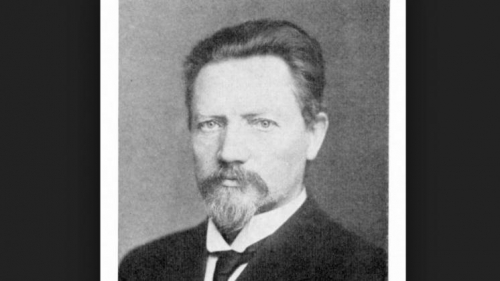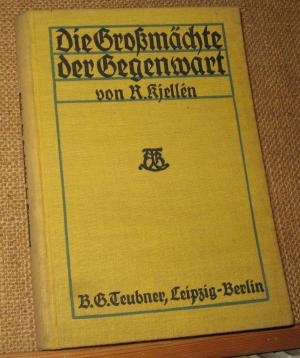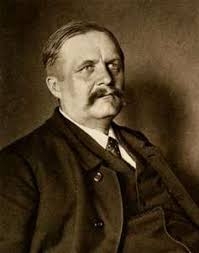mardi, 09 avril 2019
Rudolf Kjellen and Friedrich Naumann “Middle Europe”

Rudolf Kjellen and Friedrich Naumann “Middle Europe”
2.1 Defining a New Science
A Swede, Rudolf Kjellen, was the first to use the term “Geopolitics.”
Kjellen was a professor of history and political science at the University of Uppsalla and Goteborg University. However, he was an active participant in politics, he held a seat in parliament, and his politics were distinguished by an underlying Germanophilic orientation. Kjellen was not a professional geographer, but he developed the basics of geopolitics as part of political science. His work originated from Ratzel’s (he considered him to be his mentor).
Kjellen’s geopolitics can be identified in the following passage: “This—the science of governments (states) as geographical organisms—is incarnate in the land.”
Apart from “Geopolitics,” Kjellen proposed four more neologisms, which in his view should be the basis for the partition of political science into separate sections.
-
Ecopolitics: “The study of dynamics impulses, transferred from the people to the state.”
-
Demopolitics: “The study of dynamic impulses transferred from the people to the state,” an analogue is Ratzel’s “Anthrogeography.”
-
Sociopolitical: “The study of the social aspect of the state.”
-
Kratospolitics: “The study of the forms of governments and powers in relation to the problems of rights and socioeconomic factors.”
 But all of these disciplines, which Kjellen cultivated in parallel with geopolitics, did not receive more widespread recognition aside from the term “Geopolitics,” which steadily became established in quite varied circles.
But all of these disciplines, which Kjellen cultivated in parallel with geopolitics, did not receive more widespread recognition aside from the term “Geopolitics,” which steadily became established in quite varied circles.
2.2 The State as a Life Form and Interests in Germany
In his foundational work “The State as a Life Form” (1916), Kjellen developed postulations that had been hypothesized by Ratzel in his works. Kjellen, similar to Ratzel, considered himself a believer in German “Organicism,” rejecting the mechanistic state and society approach. The rejection of the strict bleaching of study in terms of “inanimate objects” (background), and “human subjects” (personalities), is a distinctive feature of geopolitics. In this sense, the very meaning of geopolitics is displayed in Kjellen’s work.
Kjellen developed Ratzel’s geopolitical principles and applied them to specific historical situations in his contemporary Europe.
He followed Ratzel’s idea of “a continental state” to its logical conclusion and applied it to Germany. He showed that in the European context Germany constitutes that space, which possesses the pivotal dynamism and is intended to structure itself to become encircled by the remaining European powers. Kjellen interpreted World War I to be a natural conflict arising between a dynamic, expanding Germany (Axis nations) opposed by the peripheral European (and non-European) states (the Entente). Differences in the dynamics of geopolitical growth—downwards for England and France and upwards for Germany— predetermined the basic alignment of forces. Wherein, from his point of view, this is the natural and inevitable geopolitical position for Germany, despite the temporary defeat in World War I.
Kjellen consolidated Ratzel’s geopolitical maxims that were in the interests of Germany (= the interests of Europe), in opposition to the interests of the Western European powers (especially England and France). But Germany, a “young” state, and the Germans, a “young people” (this idea—of “young peoples,” which is what Russians and Germans were considered to be—dates back to Fyodor Dostoevsky, who was quoted more than once by Kjellen).
The “young” Germans, motivated by the “Central European Space,” should move to the level of a continental state on the global scale at the territorial expense of the “older peoples”—the French and English. Yet, the ideological aspect of geopolitical confrontations was considered by Kjellen to be secondary to the spatial aspect.
2.3 Towards the Concept of Middle Europe
Although Swedish himself, Kjellen pressed for political rapprochement between Germany and Sweden. His own geopolitical representation on the importance of the unification of German space matches exactly the theory of “Middle Europe” (Mitteleuropa), developed by Friedrich Naumann.
 In his book “Mitteleuropa” (1915), Naumann gave a geopolitical diagnosis that matches exactly with the concepts of Rudolf Kjellen. From Naumann’s point of view, to withstand competition from such organized geopolitical formations like England (and its colonies), the USA, and Russia, the peoples inhabiting Central Europe should unify and organize in new integrative, political-economic ways in this space. The axis of this space, would of course, naturally, be Germany.
In his book “Mitteleuropa” (1915), Naumann gave a geopolitical diagnosis that matches exactly with the concepts of Rudolf Kjellen. From Naumann’s point of view, to withstand competition from such organized geopolitical formations like England (and its colonies), the USA, and Russia, the peoples inhabiting Central Europe should unify and organize in new integrative, political-economic ways in this space. The axis of this space, would of course, naturally, be Germany.
Mitteleuropa differed from pure “Pan-Germanic” projects, since it was not based on nationalism, but strict geopolitical understanding, which the basic meaning was not given to ethnic unity, but commonalities in geographical fates. Naumann’s project involved the integration of Germany, Austria, the Lower Danube states, and in the wider view—France.
The geopolitical project was also supported by cultural parallels. Germany itself was the organic formation identified with spiritual notion of “mitellage,” the middle position. This was more deeply formulated in 1818 by Ernst Arndt: “God has situated us in the center of Europe: We (the Germans) are the heart of our part of the world.”
Ratzel’s ideas gradually acquired tangible traits through Kjellen and Naumann’s “Continental” theory.
00:58 Publié dans Géopolitique | Lien permanent | Commentaires (0) | Tags : rudolf kjellen, géopolitique, friedrich naumann, mitteleuropa, europe centrale, europe |  |
|  del.icio.us |
del.icio.us |  |
|  Digg |
Digg | ![]() Facebook
Facebook



Les commentaires sont fermés.